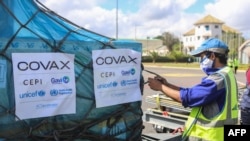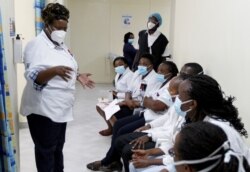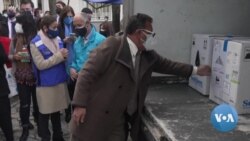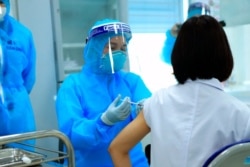The Biden administration on Thursday announced it will share 80 million excess doses of COVID-19 vaccines by the end of June, with specific plans on sharing the first 25 million doses to areas in need.
The long-awaited announcement shows that the majority, 19 million doses, will be shared via COVAX, the United Nations mechanism to ensure vaccine access for low- and middle-income countries and territories. Six million will target regional priorities and partner recipients, including Canada, Haiti, Kosovo, Mexico, the Republic of Korea, Ukraine, the West Bank and Gaza, along with Egypt, Georgia, Iraq, Jordan, and Yemen, as well as United Nations front-line workers.
Of the nearly 19 million doses that will be shared through COVAX, approximately 6 million are slated for a number of countries in the Western Hemisphere. They include Argentina, Bolivia, Brazil, Colombia, Ecuador, Paraguay and Peru in South America, along with the Central American countries of Costa Rica, El Salvador, Guatemala, Honduras and Panama. Haiti and other Caribbean Community countries, as well as the Dominican Republic, which borders Haiti, are included.
Approximately 7 million doses will head to Asia, including to Afghanistan, Bangladesh, India, Indonesia, Laos, Malaysia, the Maldives, Nepal, the Pacific Islands, Papua New Guinea, Pakistan, the Philippines, Sri Lanka, Taiwan, Thailand, and Vietnam. Five million vaccine doses will be shared with Africa in coordination with the African Union.
In a briefing to reporters, National Security Advisor Jake Sullivan said the administration will continue to donate excess supply as it becomes available.
"This is just the right thing to do," Sullivan said. "And as the president has said, [the] United States will not use its vaccines to secure favors from other countries."
Of the 80 million doses — or 13 percent of the total U.S. vaccine production — that the Biden administration has committed so far to share worldwide — 75 percent will be donated through COVAX, prioritizing Latin America and the Caribbean, South and Southeast Asia, and Africa. The rest will be shared directly with places experiencing surges, immediate neighbors, and other countries that have requested immediate U.S. assistance.
Sullivan said that the U.S. will have the authority to determine where the doses distributed via COVAX will be allocated. "But that will be done in very close consultation in partnership with COVAX, and, crucially, according to COVAX's formula, and then using the COVAX logistics capacity and delivery capacity to ensure that these doses actually translate into shots in arms that help save people's lives."
The United Nations welcomed the move, with a spokesman, Stephane Dujarric, saying, "It is very important for wealthy countries, developed countries to share as much as possible with COVAX."
"And as the secretary-general has noted, [that] none of us will be safe until all of us are safe, which means that vaccines need to be within reach of everyone, everywhere," Dujarric said, referring to U.N. Secretary-General Antonio Guterres.
AstraZeneca withheld
White House Coronavirus Response Coordinator Jeffrey Zients said the initial 25 million doses comprised vaccines already approved by U.S. health authorities for emergency use, including Moderna, Johnson & Johnson, and Pfizer.
Meanwhile, 60 million excess AstraZeneca doses — the vaccine awaiting authorization for use in the U.S. but widely approved around the world — will remain held per further review by U.S. officials.
Humanitarian organizations welcome the announcement. Tom Hart, acting CEO of ONE Campaign, an organization working to end extreme poverty and preventable disease by 2030, called it a "welcome step that will save lives and help the world extinguish this global pandemic faster."
"However, it's disappointing to see delays in donating the 60 million AstraZeneca doses — which have been approved for emergency use by the World Health Organization and will go unused otherwise," said Hart in a statement.
More needed
Others say the United States must commit to doing more, as it has secured enough doses to protect its entire population of 330 million and still have more than half a billion surplus vaccines left over.
"The 80 million doses it has promised to share barely scratches the surface of what's needed," said Carrie Teicher, director of programs at Médecins Sans Frontières (MSF) USA.
Margaret Besheer and Steve Herman contributed to this report.













